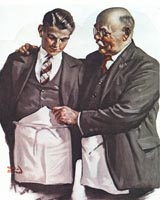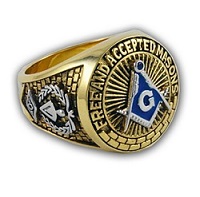Masonic Etiquette
Learn the Do's and Don'ts
of Masonic Etiquette
Masonic Etiquette, for the most part, is merely good manners and respect for your lodge, its members, its Worshipful Master and the convention of Freemasonry, in general.

Rules of Masonic Etiquette
Unfortunately, Masonic Etiquette ...or Blue Lodge Etiquette, (as it is called in the United States) is largely unpublished as well as unspoken, therefore, up until now, it has been more difficult to learn its rules and nuances.
You may study ritual work, degree work, floor work and know all Masonry’s glorious history, Masonic symbols, jewels, etc. but there is very little written about how to comport yourself so you do not look foolish or be regarded as disrespectful.
Some are small things, and some are not, but your Lodge conduct is continually on display.
Few Masonic mentors include a list of proper Lodge behavior, as they have learned it, themselves, incident-by-incident, and usually learned by them after their having made an error and being kindly informed by another member as to the correct Masonic etiquette of the situation.
CONFORMING TO MASONIC ETIQUETTE
Over time, and by watching others, members conform themselves to exhibit proper Masonic etiquette behavior to learn lodge customs.
As a newly Entered Apprentice, Fellowcraft or Master Mason, it is expected that you will exhibit the proper decorum and propriety in observance of the formal requirements which govern behavior in polite societies... BEFORE someone takes you aside to explain your errors...or you wouldn’t be reading this.
During his term in office, the brother who has been elected as Master is the most powerful member of the Lodge.
He also shoulders all of its many responsibilities.
The Worshipful Master has the authority to:
1. Rule any brother out of order on any subject at any time.
2. Decide what can and cannot be discussed. Should a brother believe that the Master is arbitrary, unjust or unfair or is acting in an illegal manner, he can appeal to the District Deputy Grand Master.
If that officer agrees that the appeal is a valid one, he will forward the complaint to the Grand Master.
If, however, that brother insists on speaking after the Master has ruled that he is out of order, he may be committing a Masonic offense.
Courteous brethren accept the requests made by the Master to serve on various committees such as the examination committee, the investigation committee and other duties, as determined by the Lodge’s needs.
The following items are not Masonic offenses, They are simply a lack of Masonic Etiquette…or in other words, considered to be “bad form” or bad manners.
So… Let’s begin:
1. WALKING BETWEEN THE ALTAR AND THE WORSHIPFUL MASTER:
Brethren do not pass between the Altar and the East when the lodge is open.
Why? As a courtesy to the Master, it is necessary that the three Great Lights which shine their eternal light and wisdom upon the Master to help him govern the lodge should never be in shadow, not even for a millisecond, during the processes of an initiation or degree work.
2. SITTING IN THE EAST:
Brethren do not take a seat in the East without an invitation... even if all other seats are full.
Why? While all Brethren within a tiled room are equal to one another, and the officers are servants of the brethren, all lodge officers have worked and studied long and hard for their lodge.
It is, therefore, the Master’s prerogative to recognize this devotion and their loyalty by inviting distinguished visitors or a special member whom the Master wishes to honor to sit with him in the East.
In other words, if you were in church, synagogue or mosque and the pews were full, would you go up and sit beside the Pastor, Rabbi or Imam (Muslim Priest)?
3. ALWAYS FULLY DRESSED:
Brethren do not enter their Lodge room either without their apron nor while putting on that apron…not even the tying of its strings.
Why? In respect to the formalities of their Lodge, officers expect that the Brethren will have the courtesy to enter it fully dressed and ready for the labor.
They should not have to wait for a member to be fully "dressed", even just tying or adjusting their apron, to salute that member. It is expected that you will be properly and entirely dressed when you pass by the Tiler and enter your lodge room.
4. STAND WHEN YOU SPEAK:
No man sits while speaking in the lodge room, no matter if he addresses an officer or another brother.
Why? All lodge activity is based on each man in the lodge as being a servant of the Brethren. This includes the Worshipful Master and his officers.
While the man, himself, who has been elected Worshipful Master does not gain any special honor, personally, as the Worshipful Master, it is to the Worshipful Master as the Master of the Lodge that a member stands to address.
It is simply a form of respect ...and no different than attending a shareholder’s meeting or a City Council meeting.
It is expected that if you wish to address the audience, you will stand so all may see who is speaking.
5. TALKING:
"Side" talk while a degree is being conferred is considered bad manners.
Why? The lodge room is a Temple of the Great Architect of the Universe. The brethren within are working to make the best ashlars (stones) for His spiritual temple.
Just as it is impolite to talk in a church, synagogue or mosque service, so it is improper to distract the officers, the workers in the degree or the candidate.
Talking without asking to do so shows irreverence for the proceedings. God’s house is not for social conversation within the lodge room. It is for worship and learning the lesson of the day which is being taught.
Unless you have requested of the Master to speak, silence is the rule. This also means no whispering.
HOW? If you have something of interest to say, raise your hand. When the Master recognizes you, you must stand up, and be recognized by the Master to speak. To address the brethren, you should say:
“Worshipful Master, Right Worshipfuls, Worshipfuls, Wardens and Brethren”.
If the Most Worshipful Master is in attendance, you should say:
“Worshipful Master, Most Worshipful, Right Worshipfuls, Worshipfuls, Wardens and Brethren.
6. SPEAKING:
If you wish to offer a predetermined motion or matter for discussion, advise the Master beforehand.
Why? Advising the Master before the meeting that you intend to bring up a specific motion or a matter for discussion is an important courtesy.
You may, indeed, do it without advising him in advance, but the Master may have plans of his own for that meeting, for which your proposed motion or discussion may not easily fit into the allotted time frame.
As a courtesy to him, his work, and his dedication to the members, it is best to ask him privately, beforehand, if he will be able to recognize you to speak your purpose. This saves "face" for both of you.
You will not publicly be refused and he will not have to seem disagreeable or arrogant in his refusal of your motion. If you wish to speak, (see number 6.), above.
7. OBEY THE GAVEL:
You must immediately obey the gavel.
Why? Failure to immediately obey the gavel is a GRAVE DISCOURTESY and VERY poor Masonic Etiquette.
The Master is all powerful in the lodge and his word is final.
He can put or refuse to put any motion.
He can rule any brother out of order on any subject at any time.
He can say what he will, and what he will not, permit to be discussed.
Brethren who think him unfair, arbitrary, unjust, or acting illegally have redress.
The Grand Lodge can be appealed to on any such matter. However, in the lodge, the Master’s gavel, which is his emblem of authority, is supreme.
When a brother is rapped down, he should obey at once, without any further discussion. It is VERY bad manners to do otherwise. In fact, it is perilously close to the line between bad manners and a Masonic offense.
Masonic etiquette decries anyone who does not obey the gavel.
8. TURNING YOUR BACK:
Never turn one’s back on the Master to address the lodge without first receiving permission from the Master to speak.
Why? Any debates that are in motion must be conducted using proper Masonic etiquette. One always stands to order when addressing the chair.
Customs differ in various jurisdictions as to the method of salute, however some salute should always be given when addressing the Master.
Two brethren, both on their feet, simultaneously arguing a motion, who are facing each other and ignoring the Master is unacceptable.
9. SALUTE:
Some lodges (not all) offer salutes to the Master. Each of the brethren will salute the Master when they enter and when they leave their Masonic Mother lodge room or any other Masonic lodge room.
Some lodges offer salutes to the Senior Warden.
Why? The Masonic etiquette of saluting the Master is your renewed pledge of fealty and service. It is your public display of decorum before all other brothers of your obligation.
It shows your courteous respect for all that the Master stands for and shows that you acknowledge his authority.
Salutes should reflect your heart-felt respect for all that for which he stands.
The salute to the Master is your pledge of honor and service, your publicly shown obligation. A lazy, sloppy or improper salute is to be Masonically impolite and, thus, to exhibit poor Masonic etiquette.
10. BALLOTING:
Do not enter or leave the lodge room during a ballot.
Why? It is discourteous to leave the lodge room during a speech, during a degree, etc. There are several natural periods, such as at the end of one section and before the next begins, or when the Master puts the lodge at ease until the sound of the gavel. Then, and only then, you may leave the lodge without being considered rude.
It is Masonic Etiquette that all brethren are expected to vote when requested to do so.
Failure to cast your ballot not only results in your failure to share in your duties, but is in direct disobedience of the Master’s request.
11. VOTING IS MANDATORY:
When an issue is put to a vote, all brethren should vote.
Why? A brother who does not vote is discourteous because he skews the ballot. He becomes the weak link in a strong chain.
No matter what the reason of his non-vote, he injures the lodge’s ballot, its value and its secrecy. Failure to vote can injure a lodge’s feeling of brotherhood, and by that injury, can injure the Masonic fraternity.
No matter what reason you may privately hold about voting, it is poor Masonic Etiquette to fail to vote when requested to do so by the Master.
12. SMOKING:
No smoking in the lodge room.
Why? While there are lodges who allow smoking during the business meeting (and you must be guided by the customs of your Mother Lodge), the ceremonies you take part in and watch are solemn occasions.
In most lodge rooms, it is considered VERY disrespectful to smoke while the ceremonies are taking place. Smoking may take place in other parts of your building or outside and during refreshment.
13. SHOULDERING THE WORK:
It is good Masonic Etiquette to accept a request made in the name of the lodge
if it is within your abilities.
Why? A lodge is a working "beehive of industry". A request
made of you from your lodge acknowledges that the lodge trusts you to
competently fulfill such a request based upon your knowledge.
14. CORRECTION OF VERBAL ERRORS:
Lodge customs state that no one except for the Worshipful Master or his prearranged designee, may correct any mistake that may occur during the course of a Ceremony, and even he does so only when the error is a serious one.
Why? It is discourteous to point out others mistakes in front of the lodge brethren. If you are in possession of a mind which allows you to be able to perform each and every degree and ceremony, perfectly, please advise the Worshipful Master of such that he may take advantage of your services to mentor others.
15. EXHIBIT GOOD POSTURE:
Why? Good posture is necessary while within the Lodge room. Lounging, leaning and slovenly attitudes should be avoided.
Poor posture is considered poor Masonic etiquette.
16. NO PRACTICAL JOKES NOR OFF-COLOR STORIES:
Why? The great lessons of Masonry, which are taught by our ritual, should never be demeaned by levity or pranks.
The lodge room is not a proper location for the telling of practical jokes, pranks, horseplay nor off-color stories.
17. USE PROPER MASONIC NAMES:
Why? It is common courtesy to be accurate in speaking a brother’s name, so it is proper Masonic etiquette to address officers, members, and visitors by their correct Masonic titles and addresses.
18. ENTERING LODGE AFTER THE MEETING HAS BEGUN:
If a brother should enter the Lodge after the opening ceremony is under way, he should go to the Altar to salute the Master.
If he must leave before the meeting is over, the correct Masonic etiquette of his departure is that he should salute the Presiding Master at the Altar before he departs.
The salute should always be given properly and not in a careless or perfunctory manner.
19. ALL PRAYERS AT LODGE FUNCTIONS ARE NON-SECTARIAN:
Freemasonry is worldwide and holds no sectarian views.
Non-sectarian means not sectioned into one, specific religion. Freemasonry embraces all religions.
A Mason may choose the religion of his choice in his private life but should be aware and open to the fact that others among the brethren do not necessarily share nor were they brought up with the religious dogmas
and beliefs that you, personally, embrace.
Why? Prayers at lodge functions should be scrupulously in keeping with
Masonic teachings. The Masonic Etiquette of offered prayers is that they
should never be an expression of specific sectarian views or dogmatic creeds.
It is a matter of courtesy that all prayers, speeches and discussions at Masonic affairs avoid sectarian, controversial or political tones.
Prayers are best directed to the Creator, the Master Architect of the Universe and not toward specific religious teachings such as Jesus Christ, Mother Mary, Muhammad, Jehovah, etc.
To do so omits the religions of others within the brethren, which can cause conflict and therefore not be harmonious to the whole.
In the spirit of non-sectarianism, we must remember that since the day that our Creator found that Man created the Tower of Babel to glorify themselves; it is HE who changed man's language into the many diverse languages now spoken on Earth.
In so doing, our Creator has many names across the world.
20. TURN CELL PHONES OFF:
All cell phones should be turned off before entering the
lodge room so as not to disrupt the proceedings.
Masonic Etiquette Summary:
Masonic etiquette is simply the rules of good manners which make lodge meetings pleasant for everyone.
The position of Worshipful Master in the East occupies the most exalted position within the lodge.
A lodge which does not honor its Master, no matter how they personally feel about the man, himself, lacks Masonic courtesy.
The honor conveyed by the brethren in electing him,
...in other words, the historical traditions and the men who have gone before you must be given the utmost respect, if the traditions of the Fraternity are to be observed and
proper Masonic etiquette is to be maintained.
Masonic etiquette comprises lodge courtesies and proprieties.
Good manners imply observance of the formal requirements governing man's behavior in polite society and a sense of what is appropriate for a person of good breeding with high morals and good taste.
The spirit of brotherly love and affection, by which we are bound together, will be exemplified in our conduct, our carriage and our behavior at all times.
It is my hope that you will use your trowel to cement the stones of brotherly love for the “More Noble and Glorious Purpose” of exhibiting these rules of Masonic Etiquette toward one and all within the brethren.
Bookmark It!
You can bookmark any page on this website to your personal Google bookmarks by clicking on the Google icon at the very bottom of each page.
Print and Discuss:
Then, at your next Lodge meeting, you or your Lodge Education Officer may wish to print this page to discuss its contents during your section about Masonic Etiquette training.
LINK to this Website: If you would like to link to this website, in order to help
others learn, please feel free to do so. You may link to any page that you wish.
My only request is that your anchor text clearly state the name of the page where your link will take the visitor, e.g.: Masonic etiquette, Freemason symbols, Masonic words, etc., in lieu of "here", "more", "read this", etc.
Thank you.
Simon
Masonic Etiquette Education
Builds
Masonic Retention
Freemason Online Education
5 Fast Methods To Find the Information You Want to Learn About
- Search Box - Use the Search Box at the top of your page.
- Site Map - Use my Site Map page to find the topics you are most interested in.
- Carousel - Use the carousel of pages at the top of your screen.
- Menu Icon - On MOBILE, click the MENU button at the top of each page.
- Masonic Books - Browse through a selection of Masonic books.








